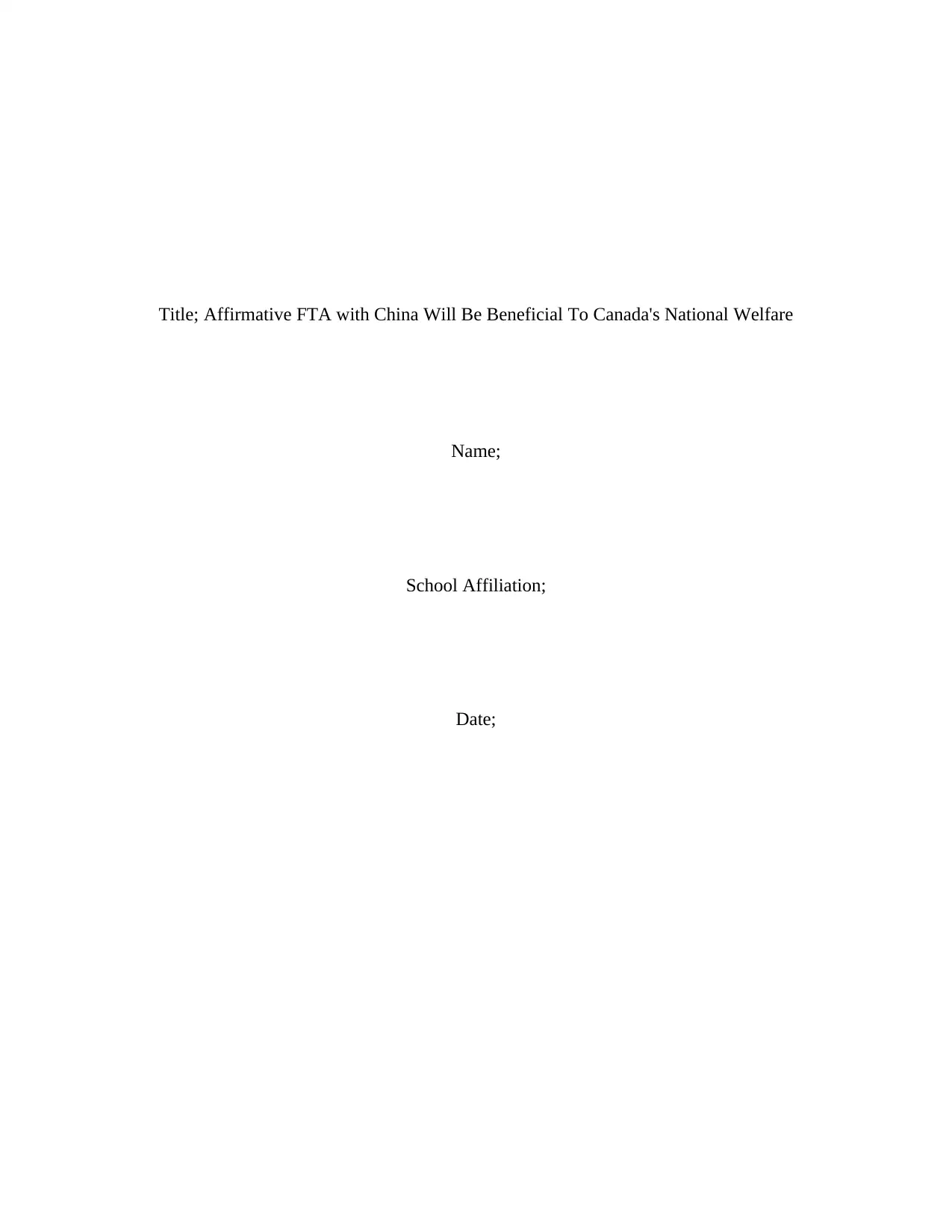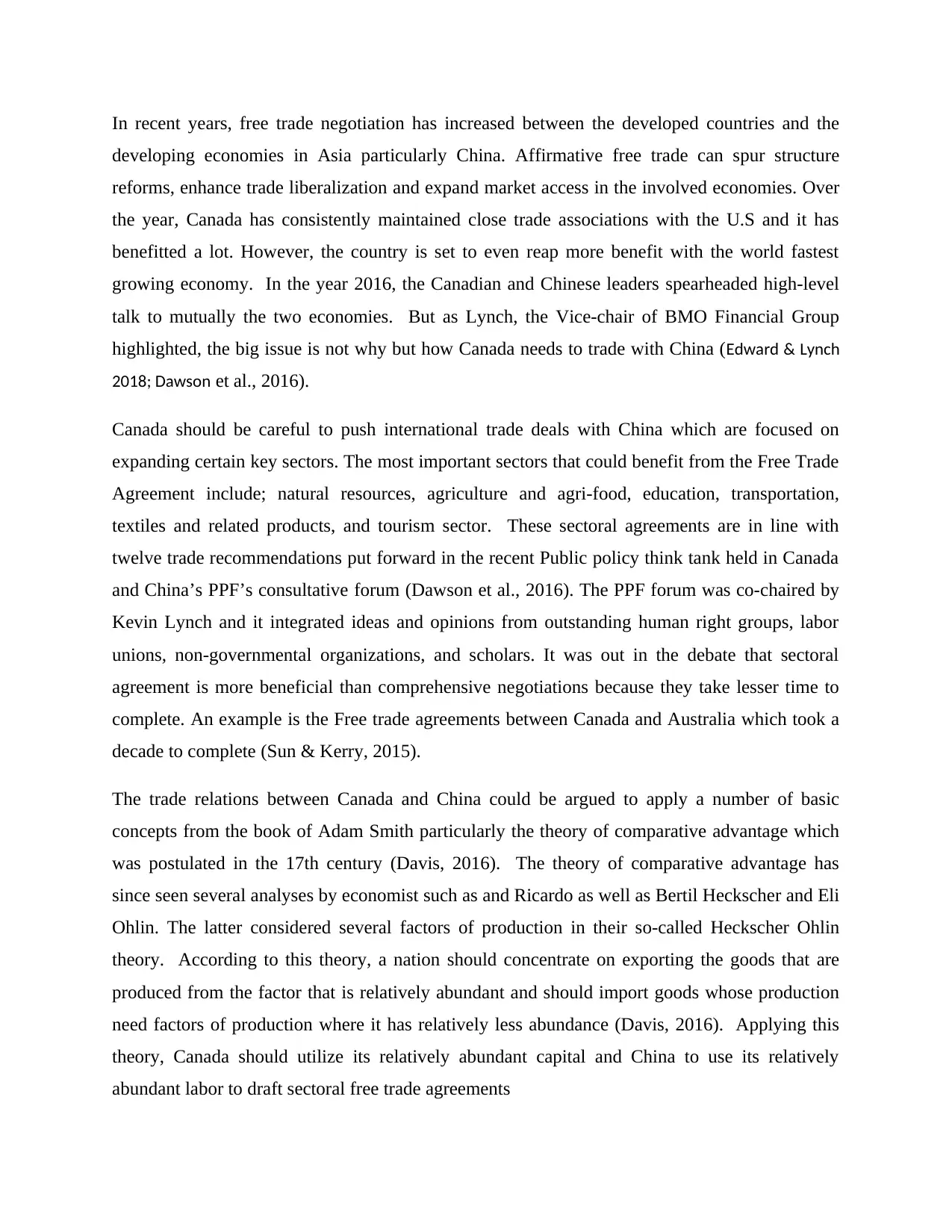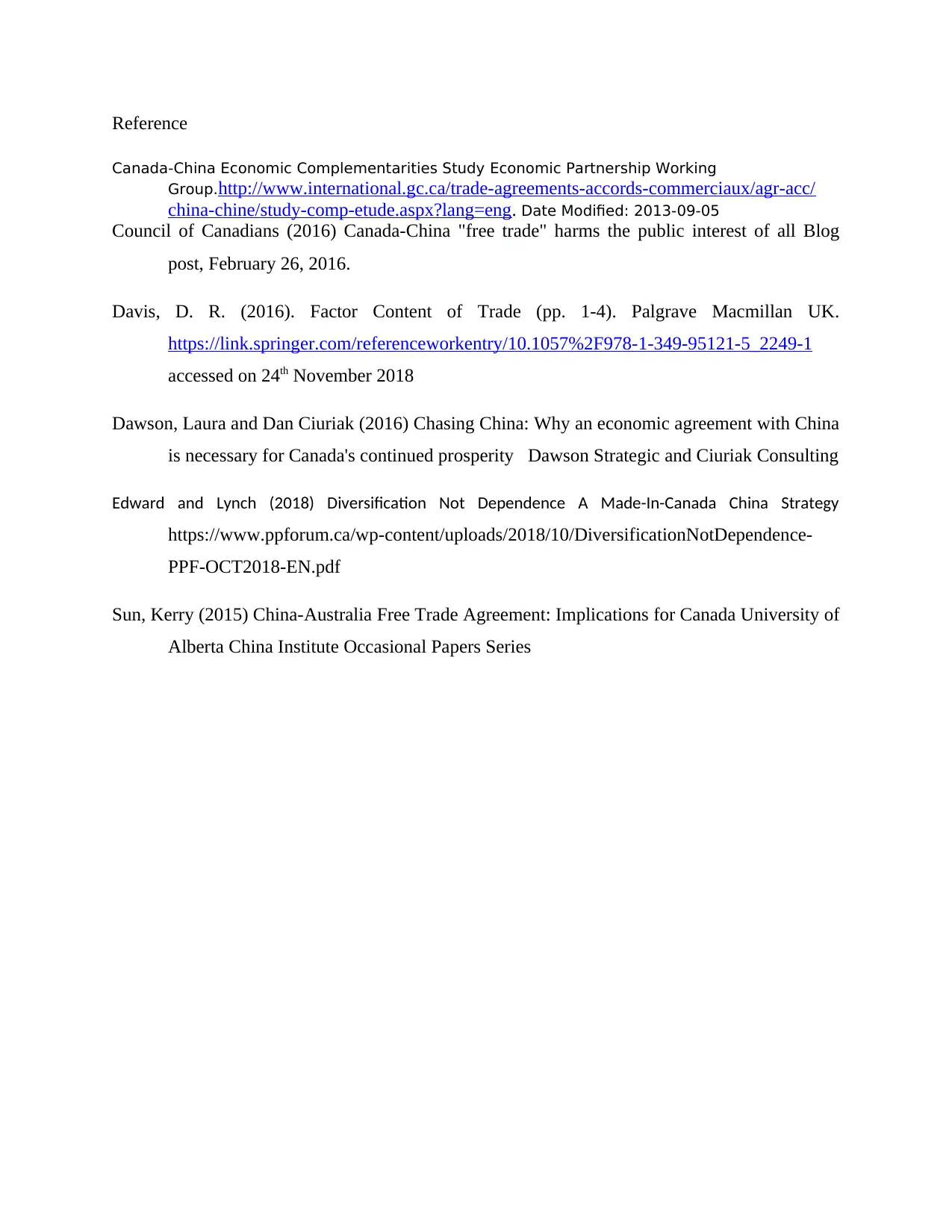Affirmative FTA with China Will Be Beneficial To Canada's National Welfare
VerifiedAdded on 2023/05/29
|3
|625
|441
AI Summary
This article discusses the benefits of affirmative free trade agreement between Canada and China. It highlights the importance of sectoral agreements in natural resources, agriculture, education, transportation, textiles, and tourism. The article also applies the theory of comparative advantage to suggest that Canada should utilize its relatively abundant capital and China to use its relatively abundant labor to draft sectoral free trade agreements.
Contribute Materials
Your contribution can guide someone’s learning journey. Share your
documents today.

Title; Affirmative FTA with China Will Be Beneficial To Canada's National Welfare
Name;
School Affiliation;
Date;
Name;
School Affiliation;
Date;
Secure Best Marks with AI Grader
Need help grading? Try our AI Grader for instant feedback on your assignments.

In recent years, free trade negotiation has increased between the developed countries and the
developing economies in Asia particularly China. Affirmative free trade can spur structure
reforms, enhance trade liberalization and expand market access in the involved economies. Over
the year, Canada has consistently maintained close trade associations with the U.S and it has
benefitted a lot. However, the country is set to even reap more benefit with the world fastest
growing economy. In the year 2016, the Canadian and Chinese leaders spearheaded high-level
talk to mutually the two economies. But as Lynch, the Vice-chair of BMO Financial Group
highlighted, the big issue is not why but how Canada needs to trade with China (Edward & Lynch
2018; Dawson et al., 2016).
Canada should be careful to push international trade deals with China which are focused on
expanding certain key sectors. The most important sectors that could benefit from the Free Trade
Agreement include; natural resources, agriculture and agri-food, education, transportation,
textiles and related products, and tourism sector. These sectoral agreements are in line with
twelve trade recommendations put forward in the recent Public policy think tank held in Canada
and China’s PPF’s consultative forum (Dawson et al., 2016). The PPF forum was co-chaired by
Kevin Lynch and it integrated ideas and opinions from outstanding human right groups, labor
unions, non-governmental organizations, and scholars. It was out in the debate that sectoral
agreement is more beneficial than comprehensive negotiations because they take lesser time to
complete. An example is the Free trade agreements between Canada and Australia which took a
decade to complete (Sun & Kerry, 2015).
The trade relations between Canada and China could be argued to apply a number of basic
concepts from the book of Adam Smith particularly the theory of comparative advantage which
was postulated in the 17th century (Davis, 2016). The theory of comparative advantage has
since seen several analyses by economist such as and Ricardo as well as Bertil Heckscher and Eli
Ohlin. The latter considered several factors of production in their so-called Heckscher Ohlin
theory. According to this theory, a nation should concentrate on exporting the goods that are
produced from the factor that is relatively abundant and should import goods whose production
need factors of production where it has relatively less abundance (Davis, 2016). Applying this
theory, Canada should utilize its relatively abundant capital and China to use its relatively
abundant labor to draft sectoral free trade agreements
developing economies in Asia particularly China. Affirmative free trade can spur structure
reforms, enhance trade liberalization and expand market access in the involved economies. Over
the year, Canada has consistently maintained close trade associations with the U.S and it has
benefitted a lot. However, the country is set to even reap more benefit with the world fastest
growing economy. In the year 2016, the Canadian and Chinese leaders spearheaded high-level
talk to mutually the two economies. But as Lynch, the Vice-chair of BMO Financial Group
highlighted, the big issue is not why but how Canada needs to trade with China (Edward & Lynch
2018; Dawson et al., 2016).
Canada should be careful to push international trade deals with China which are focused on
expanding certain key sectors. The most important sectors that could benefit from the Free Trade
Agreement include; natural resources, agriculture and agri-food, education, transportation,
textiles and related products, and tourism sector. These sectoral agreements are in line with
twelve trade recommendations put forward in the recent Public policy think tank held in Canada
and China’s PPF’s consultative forum (Dawson et al., 2016). The PPF forum was co-chaired by
Kevin Lynch and it integrated ideas and opinions from outstanding human right groups, labor
unions, non-governmental organizations, and scholars. It was out in the debate that sectoral
agreement is more beneficial than comprehensive negotiations because they take lesser time to
complete. An example is the Free trade agreements between Canada and Australia which took a
decade to complete (Sun & Kerry, 2015).
The trade relations between Canada and China could be argued to apply a number of basic
concepts from the book of Adam Smith particularly the theory of comparative advantage which
was postulated in the 17th century (Davis, 2016). The theory of comparative advantage has
since seen several analyses by economist such as and Ricardo as well as Bertil Heckscher and Eli
Ohlin. The latter considered several factors of production in their so-called Heckscher Ohlin
theory. According to this theory, a nation should concentrate on exporting the goods that are
produced from the factor that is relatively abundant and should import goods whose production
need factors of production where it has relatively less abundance (Davis, 2016). Applying this
theory, Canada should utilize its relatively abundant capital and China to use its relatively
abundant labor to draft sectoral free trade agreements

Reference
Canada-China Economic Complementarities Study Economic Partnership Working
Group.http://www.international.gc.ca/trade-agreements-accords-commerciaux/agr-acc/
china-chine/study-comp-etude.aspx?lang=eng. Date Modified: 2013-09-05
Council of Canadians (2016) Canada-China "free trade" harms the public interest of all Blog
post, February 26, 2016.
Davis, D. R. (2016). Factor Content of Trade (pp. 1-4). Palgrave Macmillan UK.
https://link.springer.com/referenceworkentry/10.1057%2F978-1-349-95121-5_2249-1
accessed on 24th November 2018
Dawson, Laura and Dan Ciuriak (2016) Chasing China: Why an economic agreement with China
is necessary for Canada's continued prosperity Dawson Strategic and Ciuriak Consulting
Edward and Lynch (2018) Diversification Not Dependence A Made-In-Canada China Strategy
https://www.ppforum.ca/wp-content/uploads/2018/10/DiversificationNotDependence-
PPF-OCT2018-EN.pdf
Sun, Kerry (2015) China-Australia Free Trade Agreement: Implications for Canada University of
Alberta China Institute Occasional Papers Series
Canada-China Economic Complementarities Study Economic Partnership Working
Group.http://www.international.gc.ca/trade-agreements-accords-commerciaux/agr-acc/
china-chine/study-comp-etude.aspx?lang=eng. Date Modified: 2013-09-05
Council of Canadians (2016) Canada-China "free trade" harms the public interest of all Blog
post, February 26, 2016.
Davis, D. R. (2016). Factor Content of Trade (pp. 1-4). Palgrave Macmillan UK.
https://link.springer.com/referenceworkentry/10.1057%2F978-1-349-95121-5_2249-1
accessed on 24th November 2018
Dawson, Laura and Dan Ciuriak (2016) Chasing China: Why an economic agreement with China
is necessary for Canada's continued prosperity Dawson Strategic and Ciuriak Consulting
Edward and Lynch (2018) Diversification Not Dependence A Made-In-Canada China Strategy
https://www.ppforum.ca/wp-content/uploads/2018/10/DiversificationNotDependence-
PPF-OCT2018-EN.pdf
Sun, Kerry (2015) China-Australia Free Trade Agreement: Implications for Canada University of
Alberta China Institute Occasional Papers Series
1 out of 3
Your All-in-One AI-Powered Toolkit for Academic Success.
+13062052269
info@desklib.com
Available 24*7 on WhatsApp / Email
![[object Object]](/_next/static/media/star-bottom.7253800d.svg)
Unlock your academic potential
© 2024 | Zucol Services PVT LTD | All rights reserved.